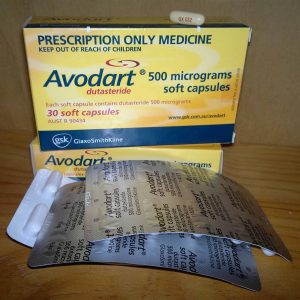
Similar to how other hair loss drugs work such as finasteride, dutasteride (Avodart®) decreases levels of dihydrotestosterone (DHT) in the body (1). DHT causes miniaturization of hair follicles, leading to hair loss, and inhibition of DHT could result in maintenance and/or an increase in the density of hair. Daily use of dutasteride has been shown to decrease the level of DHT in the scalp by 79% (2). Moreover, dutasteride lasts much longer in the body (months) compared to finasteride (days), allowing for prolonged suppression of DHT levels (3).
Few clinical trials have been completed on dutasteride for hair loss therapy, as dutasteride is not currently approved for the treatment of hair loss. Any use of dutasteride for hair restoration is an off-label (not US FDA approved) treatment. Caution should be taken when considering off-label use of any drug; make sure to always consult your hair loss specialist and/or physician before changing medications.
In Phase II clinical trial with young men (21-45 years) exhibiting male pattern hair loss, the effect of dutasteride on hair growth was superior to finasteride in a dose-dependent manner(2). Moreover, an increase in hair growth was visible earlier in the 2.5mg dutasteride treatment group (12 weeks), compared to the 5mg finasteride group (24 weeks) (2). In a Phase III clinical trial (NCT01231607), 0.5mg dutasteride showed a marked increase in target area hair count at week 24 compared to 1mg finasteride.
In a small 3-year study using women with female pattern hair loss, both finasteride and dutasteride were able to improve hair thickness in two-thirds of participants (4). The increase in hair thickness was similar to that seen in previous studies using male participants. Dutasteride was more effective for women who were younger than 50 years, so for women over the age of 50 years, minoxidil may be the best option. Because finasteride and dutasteride affect hormone levels, these are only possible options for women who are not, and do not want to become pregnant in the future.
As with finasteride, use of dutasteride may cause sexual side effects such as loss of libido, gynecomastia, impotence, and reduced sperm count in men (2,5). Although it has been mentioned that the sexual side effects decrease with time, the complete set of side effects is still unknown. Moreover, persons using dutasteride should not donate blood, as this could affect a developing fetus should a pregnant woman require a blood transfusion. If you wish to donate blood after stopping dutasteride treatment, a 6 month wash-out period is strongly suggested.
Article by: Dr. C.D. Studholme PhD, Mediprobe Research Inc.
- Clark RV, Hermann DJ, Cunningham GR, Wilson TH, Morrill BB, Hobbs S. Marked suppression of dihydrotestosterone in men with benign prostatic hyperplasia by dutasteride, a dual 5alpha-reductase inhibitor. J Clin Endocrinol Metab. 2004 May;89(5):2179–84.
- Olsen EA, Hordinsky M, Whiting D, Stough D, Hobbs S, Ellis ML, et al. The importance of dual 5a-reductase inhibition in the treatment of male pattern hair loss: Results of a randomized placebo-controlled study of dutasteride versus finasteride. J Am Acad Dermatol. 2006 Dec;55(6):1014–23.
- Rahnayake D, Sinclair R. Male Androgenetic Alopecia. In: De Groot LJ, Beck-Peccoz P, Chrousos G, Dungan K, Grossman A, Hershman JM, et al., editors. Endotext [Internet]. South Dartmouth (MA): MDText.com, Inc.; 2000 [cited 2015 Dec 3]. Available from: http://www.ncbi.nlm.nih.gov/books/NBK278957/
- Verdonschot E, Boersma I, Oranje A, Grimalt R, Iorizzo M, Piraccini B. The effectiveness of finasteride and dutasteride used for 3 years in women with androgenetic alopecia. Indian J Dermatol Venereol Leprol. 2014;80(6):521.
- Prescribing information for Avodart(R) (dutasteride) Soft Gelatin Capsules. The USA. [Internet]. GlaxoSmithkline [uptaded May 2005]; Available from: : http://us.gsk.com/products/assets/us_avodart.pdf.












